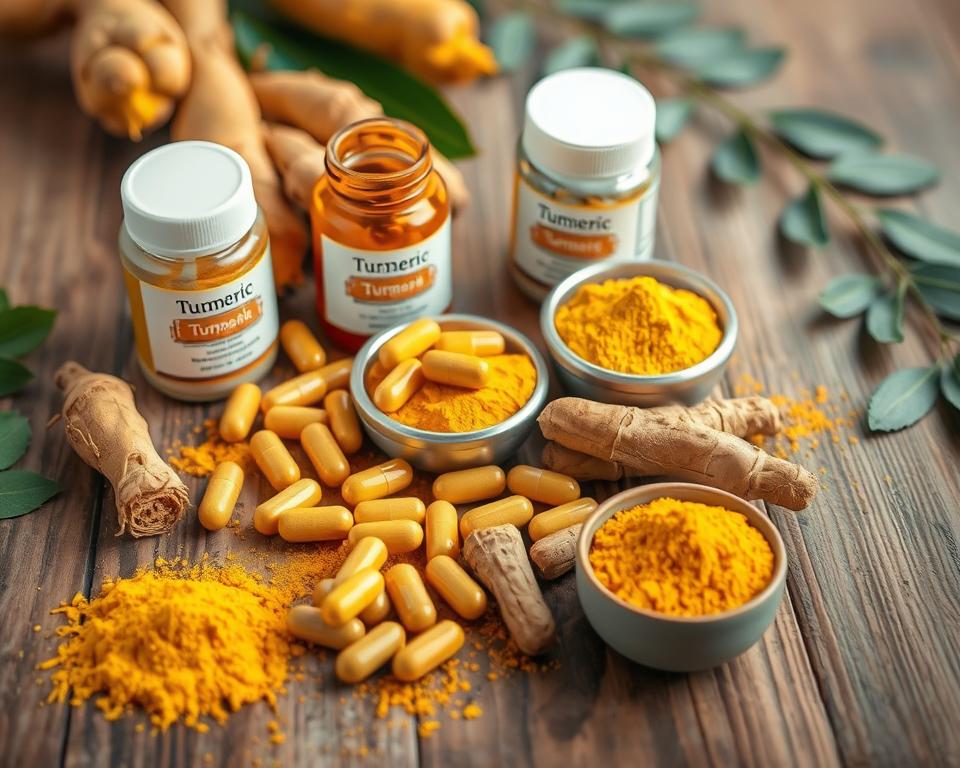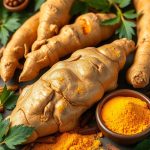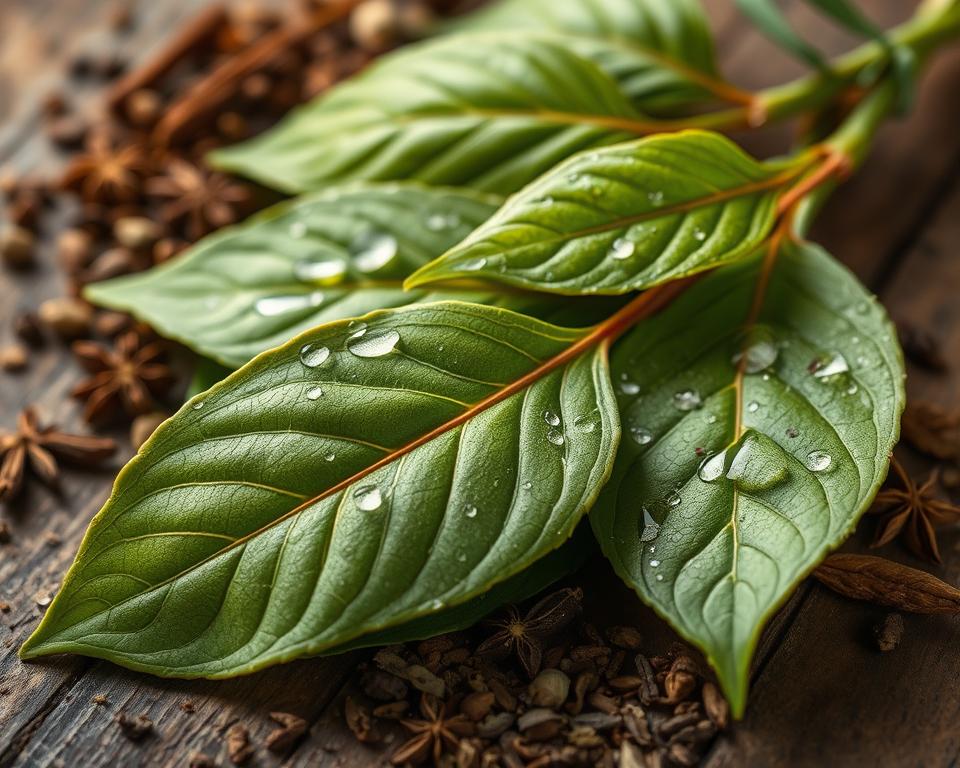Turmeric is a bright golden-yellow spice that has been valued for its health perks and many uses. This guide will dive into the science of turmeric’s anti-inflammatory and antioxidant powers. It will also look at how it can help with digestion, brain function, and skin health. Learn how this ancient superfood can fit into your daily routine.
Read interesting things at : tosawakan
Key Takeaways
- Turmeric is a versatile spice with a wide range of health benefits.
- Curcumin, the active compound in turmeric, is a powerful antioxidant and anti-inflammatory agent.
- Turmeric may support digestive health, heart health, and brain function.
- Turmeric has antimicrobial and antibacterial effects, and may be beneficial for arthritis and skin conditions.
- Turmeric can be easily incorporated into your diet through recipes like golden milk and curry dishes.
What is Turmeric?
Turmeric is a bright spice that has been around for centuries. It’s used in traditional Ayurvedic and Chinese medicine. It comes from the rhizome of the Curcuma longa plant. This golden spice is key in many dishes, especially in Indian and Southeast Asian cooking.
Botanical Profile
The Curcuma longa plant is part of the ginger family, Zingiberaceae. Its rhizome looks like ginger and is where turmeric powder comes from. The plant’s leaves are long and the flowers are yellowish-white.
Traditional Uses
- In Ayurvedic medicine, turmeric is known for its anti-inflammatory and antioxidant effects.
- In traditional Chinese medicine, it treats digestive issues, skin problems, and joint pain.
- It’s also a spice, coloring agent, and natural preservative in many cuisines.
Turmeric is loved for its unique taste and color. It’s used in both traditional and modern cooking. Its versatility is widely appreciated.
Curcumin: The Golden Compound
Turmeric’s amazing health benefits come from its main active compound, curcumin. This substance gives turmeric its bright golden color. It’s also the reason why turmeric is studied for its strong antioxidant and anti-inflammatory effects.
Curcumin is a key molecule with many health benefits. It acts as a strong antioxidant, fighting off harmful free radicals. This helps protect cells from damage. It also reduces inflammation, which is linked to many chronic diseases.
| Key Curcumin Benefits | Mechanism of Action |
|---|---|
| Antioxidant activity | Neutralizes free radicals and reduces oxidative stress |
| Anti-inflammatory effects | Inhibits inflammatory pathways and reduces inflammation |
| Neuroprotective properties | Protects brain cells and supports cognitive function |
| Antimicrobial and antibacterial effects | Inhibits the growth of harmful microbes and bacteria |
The versatility of curcumin, found in turmeric, is amazing. This antioxidant can help with many health issues, like reducing inflammation and protecting brain function. As we learn more about this golden compound, its health benefits keep growing.
Potent Antioxidant and Anti-Inflammatory Properties
Turmeric is known for its amazing health benefits. These come from its strong antioxidant and anti-inflammatory properties. Curcumin, a key compound in turmeric, fights free radicals and reduces inflammation. This makes it a great natural way to handle chronic inflammation.
Neutralizing Free Radicals
Free radicals are harmful molecules that can harm cells and lead to health issues. Curcumin is a strong antioxidant that stops these free radicals. This helps protect the body from their damaging effects.
Reducing Inflammation
Chronic inflammation is linked to many health problems, like heart disease and arthritis. Curcumin’s anti-inflammatory effects stop the production of molecules that cause inflammation. This can help reduce swelling and ease symptoms.
| Antioxidant Properties | Anti-Inflammatory Properties |
|---|---|
|
|
Turmeric’s mix of curcumin’s antioxidant and anti-inflammatory effects makes it a strong natural supplement. It supports overall health and well-being.
“Curcumin, the active compound in turmeric, has the ability to neutralize free radicals and inhibit the production of inflammatory molecules, making it an effective natural remedy for managing chronic inflammation.”
Turmeric for Digestive Health
Turmeric is known for its anti-inflammatory effects. It can greatly help with digestive health. The compound curcumin in turmeric has been studied a lot. It helps with symptoms of inflammatory bowel disease.
Curcumin fights inflammation in the gut. This is common in many digestive issues. Turmeric may be a natural way to improve digestive health and gut health.
Turmeric also helps with digestion and gut function. It boosts digestive enzymes. This helps break down and absorb nutrients better, supporting gut health.
| Benefit | Mechanism of Action |
|---|---|
| Reduced Inflammation | Curcumin’s anti-inflammatory effects can help alleviate inflammation in the gut |
| Improved Digestion | Turmeric can stimulate the production of digestive enzymes, aiding in nutrient absorption |
| Gut Health Support | Turmeric’s anti-inflammatory and digestive properties can contribute to overall gut well-being |
Adding turmeric to your diet or taking supplements can help your digestive health and gut health.
Potential Benefits for Heart Health
New studies show that turmeric could be good for the heart. It has a compound called curcumin that fights inflammation. This could help lower bad cholesterol and raise good cholesterol. Turmeric might also keep blood pressure in check and support heart function.
Improving Cholesterol Levels
Studies say curcumin can manage cholesterol levels. It does this by fighting inflammation. This means it can lower bad cholesterol and boost good cholesterol. This is key for a healthy heart.
| Cholesterol Marker | Improvement with Turmeric/Curcumin |
|---|---|
| LDL (Bad Cholesterol) | Reduced levels |
| HDL (Good Cholesterol) | Increased levels |
| Total Cholesterol | Decreased overall levels |
Curcumin’s anti-inflammatory effects are thought to be why it helps with cholesterol. This makes turmeric a natural choice for heart health.
“Curcumin’s ability to reduce inflammation may play a key role in its potential to improve cholesterol levels and overall cardiovascular health.”
Turmeric and Brain Function
Research shows that turmeric’s curcumin might help protect the brain and support thinking skills. Turmeric has strong antioxidants and anti-inflammatory effects. These could be key to keeping the brain working well and lowering the risk of brain diseases.
Neuroprotective Potential
Studies look into how curcumin in turmeric can protect the brain. It can get through the blood-brain barrier to affect brain cells directly. Its antioxidants and anti-inflammatory effects could fight off harmful free radicals and reduce brain inflammation. This is important for keeping the brain sharp as we age and for fighting diseases like Alzheimer’s.
Curcumin might also boost brain-derived neurotrophic factor (BDNF). This protein is vital for growing and keeping neurons healthy. This could help improve memory, learning, and thinking skills.

“Turmeric’s active compound, curcumin, has been extensively studied for its potential neuroprotective effects, which may hold promise for supporting overall brain health and function.”
More research is needed to fully grasp how turmeric and curcumin affect brain health. But, the current findings suggest that adding turmeric to your diet could be a natural way to support brain function and cognitive health. As a neuroprotective agent, turmeric could be a great addition to a healthy lifestyle for keeping the brain in top shape.
Antimicrobial and Antibacterial Effects
Turmeric is known for its bright color and rich taste. It’s also famous for its antimicrobial and antibacterial effects. The key ingredient, curcumin, can stop many bacteria, fungi, and viruses from growing. This could help boost the immune system and fight infections.
Research shows that curcumin works against many antimicrobial and antibacterial agents. These include Staphylococcus aureus, Escherichia coli, Salmonella, and Candida species. So, turmeric could be a natural way to support immune system health.
- Curcumin has strong antimicrobial effects, especially against Gram-positive and Gram-negative bacteria.
- Turmeric extracts can stop the growth of different fungal species, like Candida albicans, which often causes infections.
- Studies suggest curcumin might fight certain viruses, helping the body’s immune system work better.
Turmeric’s ability to fight microbes and bacteria makes it a great natural option for health. But, always talk to a healthcare expert before using turmeric, especially if you have health issues or concerns.
Turmeric for Arthritis and Joint Pain
Arthritis and joint pain can really affect someone’s life. Luckily, turmeric’s natural anti-inflammatory properties might help. Curcumin, found in turmeric, has been studied a lot for easing inflammation. This is key in joint problems.
Turmeric’s Anti-Inflammatory Benefits
Many studies show turmeric helps with arthritis and joint pain. Curcumin stops making inflammatory enzymes and cytokines. These can cause swelling and pain in joints. So, turmeric might lessen joint pain and boost joint health.
Turmeric is also full of antioxidants. These fight off free radicals that can harm joint cartilage and make arthritis worse. By fighting oxidative stress, turmeric could protect joints and slow down joint diseases.
| Condition | Turmeric’s Impact |
|---|---|
| Osteoarthritis | Turmeric can be as good as ibuprofen in easing pain and improving joint function in osteoarthritis patients. |
| Rheumatoid Arthritis | Curcumin is as effective as diclofenac in reducing rheumatoid arthritis symptoms without its side effects. |
For those looking at natural ways to handle arthritis and joint pain, turmeric could be a good choice. Adding it to your diet or using it on the skin might help ease pain and better joint health. This spice could be a powerful tool for improving well-being.
Potential Cancer-Fighting Properties
Research is showing that turmeric might be a powerful tool against cancer. It’s all thanks to curcumin, a key antioxidant and anti-inflammatory in turmeric.
Curcumin can stop some cancer cells from growing and spreading. It does this by fighting free radicals and reducing inflammation. This could help prevent cancer from starting or slow its growth.
While we need more studies, the early signs are encouraging. Turmeric could be a natural way to help fight cancer alongside traditional treatments. It could be a big help in the fight against this serious disease.
“Turmeric’s potential as a cancer-fighting agent is an area of growing interest and research. The compound’s powerful antioxidant and anti-inflammatory effects make it an intriguing natural option for cancer prevention and management.”
As scientists dig deeper into turmeric’s health benefits, the outlook is promising. With its strong cancer-fighting abilities, turmeric could become a key ally in the fight against cancer.
Enhancing Skin Health
Turmeric is known for more than just its health benefits inside the body. It also helps with skin health thanks to its anti-inflammatory and antioxidant properties. Curcumin, a key part of turmeric, is studied a lot for treating skin issues like acne, eczema, and psoriasis.
Treating Skin Conditions
Many studies show turmeric can lessen skin inflammation and oxidative stress. These are big factors in common skin problems. When used on the skin or taken by mouth, turmeric can ease symptoms of different skin conditions:
- Acne: Turmeric’s anti-inflammatory and antibacterial traits can lessen acne and swelling.
- Eczema: It helps control the immune system and lowers inflammation, offering relief for eczema sufferers.
- Psoriasis: Curcumin slows down the growth of skin cells, which is a main symptom of psoriasis, improving the condition.
Turmeric also has antioxidants that shield the skin from harm and make it look more even and bright.
“Turmeric’s anti-inflammatory and antioxidant properties can significantly benefit skin health, helping to treat a variety of common skin conditions.”
Using turmeric on the skin or as a supplement is a natural way to keep and improve skin health.
Turmeric in the Kitchen
Turmeric is more than just good for you; it’s a game-changer in the kitchen too. This spice brings a unique flavor and color to dishes, especially in Indian and Southeast Asian cooking. It’s a key ingredient in curries and golden milk, making it easy to add to many recipes.
Golden Milk and Other Recipes
Golden milk is a favorite way to enjoy turmeric’s benefits. It’s a warm drink made with turmeric, milk, and spices like curry powder, ginger, and cinnamon. This drink is soothing and can help reduce inflammation, perfect for any time of day.
Turmeric isn’t just for golden milk. It fits into many cooking and baking recipes. Add it to curry dishes, rice bowls, soups, or even baked goods like muffins or smoothies. The options are endless with this golden spice.
“Turmeric not only adds a vibrant color to dishes, but it also infuses them with a warm, earthy flavor that complements a variety of ingredients.”
Whether making golden milk or adding turmeric to your daily cooking, this spice will quickly become a kitchen essential.
Turmeric Supplements and Bioavailability
For those looking to get the most out of turmeric, supplements can be a good choice. But, it’s key to know how curcumin works in the body. Curcumin, the key part of turmeric, doesn’t always get absorbed well by the body.
To make curcumin work better, some methods have been tried. Mixing turmeric supplements with black pepper is a good idea. Black pepper has a compound called piperine that boosts curcumin absorption. This means the body can use curcumin more effectively.
Adding turmeric supplements to meals with healthy fats like coconut oil or avocado also helps. Curcumin is a fat-soluble compound. So, fats help it get absorbed better in the body.
| Bioavailability Enhancement Strategies | Potential Impact |
|---|---|
| Combining turmeric with black pepper | Significantly increases curcumin absorption |
| Consuming turmeric with healthy fats | Improves curcumin’s fat-soluble absorption |
Using these tips, people can make sure they get the most from curcumin and turmeric supplements. This helps them enjoy the health benefits of this golden spice more.

“The bioavailability of curcumin is a critical factor in determining the efficacy of turmeric supplements. Addressing this through strategic combinations can unlock the full potential of this remarkable compound.”
Precautions and Side Effects
Turmeric is usually safe and good for you, but be careful with it. Taking too much or for too long can cause mild stomach issues like nausea, diarrhea, or heartburn. If you have gallbladder disease or take blood-thinning medications, talk to your doctor before using turmeric.
The safety and effectiveness of turmeric can change based on how you take it. Turmeric supplements often have more curcumin, which might increase side effects if not used carefully. Always stick to the recommended amounts and advice from experts or trusted sources to stay safe.
- Potential side effects of turmeric include gastrointestinal discomfort, such as nausea, diarrhea, or heartburn.
- Individuals with gallbladder disease or those taking blood-thinning medications should consult a healthcare provider before using turmeric.
- The safety and efficacy of turmeric may vary depending on the form and dosage, so it’s essential to follow recommended guidelines.
“Moderation is key when it comes to turmeric. While it’s a versatile and beneficial ingredient, it’s important to be mindful of potential side effects and precautions.”
Knowing the precautions and possible side effects of turmeric lets you use it safely and well in your health routine.
Conclusion
Turmeric is a superfood with a bright golden color and many health benefits. It’s packed with antioxidants and anti-inflammatory compounds. These can help with digestion, brain function, and skin health.
Learning about turmeric and its key compound, curcumin, opens up many ways to use it. You can make turmeric-infused golden milk or add it to your meals. This lets you enjoy the benefits of turmeric every day.
Adding turmeric to your life can really change how you feel. As studies show more about turmeric’s health benefits, it’s clear it’s a key part of a healthy diet. Make sure to include turmeric in your daily health routine.










